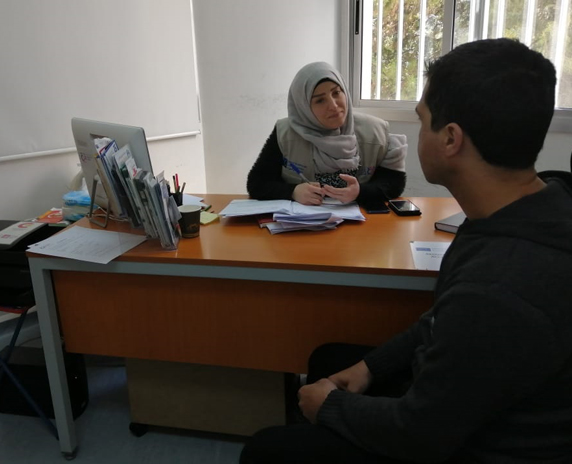This is a story that portrays the importance of social acceptance and support in a patient’s recovery process, no matter how severe the diagnosis.
Moufid is a 30 year old Lebanese patient diagnosed with schizophrenia. He was referred to the Community Mental Health Clinic by a ROVing Social Worker from a different NGO who has knowledge of the services offered in the Mental Health Clinic in Zahle, in the Bekaa Valley (Lebanon).
“When I first met Moufid, I was accompanied by the driver into the house to do my primary assessment, especially after I heard of his aggressive behavior.” He has been threatening his mother with a knife and has stabbed his brother n the back, tell us Marwa, Social Promotion Foundation case manager.
Moufid was diagnosed at 16 years old with schizophrenia, and his delusions were so powerful that with time he stopped communicating with anyone. His one trigger was whenever he saw his brother and his brother’s wife, he would start shouting profanities at them and threatening to kill both of them. At other times he would hold a knife to his mother’s face and draw a line at her throat threatening to slit it open.
His family was so ashamed to have a child who is mentally ill, so they locked him not only in the house but in the living room for days on end. “When I first visited the family Moufid had been locked in the living room for the past 3 months and has not had a shower for the past month.” An appointment was set with the psychiatrist who prescribed him medication.
The case manager worked a lot with the family, raising awareness on the disease, explaining the positive and negative symptoms of schizophrenia, what to expect from the patient in terms of behavior and how they could help her to help him adjust. Weeks after weeks, the family became not only more knowledgeable of Moufid’s diagnosis, but also more involved in his recovery. This was reflected in his improvement as well. He started accepted being in the same room as his brother. Their relationship evolved so that they are having conversations.
Moufid is now helping his mother with the house chores, and the last surprising news gotten was that Moufid had attended 3 social functions with his family.
The work in the Mental Health Clinic is carried out within the framework of the project “Reducing the economic barriers to access health services in Lebanon (REBAHS Lebanon)” that it develops in consortium with its partners International Medical Corps UK (IMC)and Première Urgence-Aide Médicale Internationale (PU-AMI). The consortium works to improve access to quality services in primary health care, community health and mental health services for Syrian refugees and other vulnerable populations in Beirut and Mount Lebanon, Akkar, Tripoli, Bekaa, and the South in close coordination with the Ministry Lebanese Public Health (MoPH).
The project is funded by the General Directorate for Neighborhood and Enlargement Negotiations (DG NEAR) of the European Commission and is based on the general objective of the European Union Regional Trust Fund in Response to the Syrian Crisis (“MADAD Fund”) of respond to the “needs of Syrian refugees in neighboring countries, as well as the communities that host refugees and their administrations, particularly in terms of resilience and speedy recovery.”






